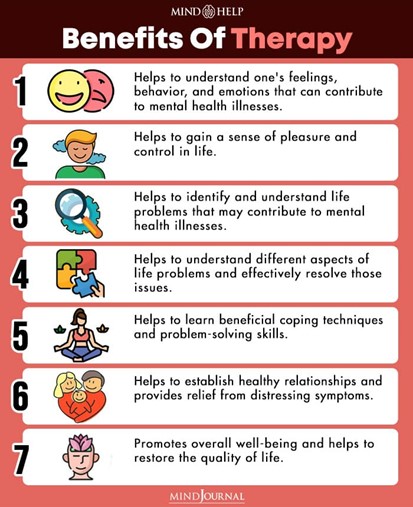Benefits of Therapy for Mental Health
Therapy, also known as counseling or psychotherapy, is a powerful tool that can significantly improve mental health and overall well-being. In this article, we will explore the numerous benefits of therapy and how it can positively impact individuals facing mental health challenges.
Enhancing Self-Awareness
One of the primary benefits of therapy is that it helps individuals develop a deeper understanding of themselves. Through regular sessions with a trained therapist, individuals can explore their thoughts, emotions, and behaviors in a safe and non-judgmental environment. This self-reflection promotes self-awareness, allowing individuals to gain insights into their patterns of thinking and behavior that may contribute to their mental health struggles.
Improving Coping Skills
Therapy equips individuals with effective coping skills to manage the challenges they face in their daily lives. Therapists work collaboratively with clients to identify unhealthy coping mechanisms and develop healthier alternatives. By learning and practicing these new coping strategies, individuals can better navigate stress, anxiety, depression, and other mental health issues.
Building Resilience
Resilience is the ability to bounce back from adversity. Therapy plays a crucial role in building resilience by helping individuals develop a stronger emotional foundation. Through therapy, individuals can learn to regulate their emotions, develop problem-solving skills, and cultivate a positive mindset. These tools empower individuals to face life’s challenges with greater resilience and adaptability.
Enhancing Communication Skills
Effective communication is essential for healthy relationships and overall well-being. Therapy provides a supportive environment for individuals to improve their communication skills. Therapists can teach techniques for active listening, assertiveness, and conflict resolution. By enhancing their communication skills, individuals can foster healthier relationships, both personally and professionally.
Identifying and Changing Negative Thought Patterns
Many mental health issues are rooted in negative thought patterns and beliefs. Therapy helps individuals identify these negative patterns and challenges them with more realistic and positive alternatives. By reframing negative thoughts, individuals can experience a shift in their perspective, leading to improved mental health and a more positive outlook on life.
Support in Times of Crisis
During times of crisis, therapy serves as a valuable support system. Whether it’s dealing with a traumatic event, grief, or major life transitions, therapists can provide guidance, empathy, and coping strategies to help individuals navigate through these challenging times. Having a professional to lean on during difficult periods can make a significant difference in one’s ability to heal and recover.

Therapy offers a wide range of benefits for mental health, including enhanced self-awareness, improved coping skills, resilience building, communication skill development, identification and change of negative thought patterns, and support during times of crisis. If you are facing mental health challenges, consider seeking therapy to embark on a journey of self-discovery, growth, and healing.
Frequently Asked Questions
1. What is therapy for mental health?
Therapy for mental health is a professional treatment approach that aims to improve an individual’s emotional well-being and address mental health concerns through various therapeutic techniques.
2. How can therapy benefit mental health?
Therapy can benefit mental health by providing a safe and supportive environment for individuals to explore their thoughts and emotions, develop coping skills, gain self-awareness, and work toward positive change.
3. Who can benefit from therapy?
Therapy can benefit anyone who is experiencing mental health challenges or seeking personal growth. It is suitable for individuals of all ages, backgrounds, and mental health conditions.
4. What are some common types of therapy for mental health?
Some common types of therapy for mental health include cognitive-behavioral therapy (CBT), psychodynamic therapy, mindfulness-based therapy, family therapy, and group therapy.
5. How long does therapy usually last?
The duration of therapy varies depending on individual needs and goals. Some individuals may find short-term therapy sufficient, while others may benefit from long-term therapy to address deeper issues.
6. Are the benefits of therapy immediate?
The benefits of therapy may not be immediate for everyone. It often takes time to build a therapeutic relationship, gain insights, and implement changes. However, therapy can provide ongoing support and progress over time.
7. Can therapy help with specific mental health conditions?
Yes, therapy can help with specific mental health conditions such as anxiety disorders, depression, bipolar disorder, post-traumatic stress disorder (PTSD), obsessive-compulsive disorder (OCD), and many others.
8. Is therapy only for people with severe mental health issues?
No, therapy is not only for people with severe mental health issues. It can be beneficial for individuals dealing with mild to moderate mental health challenges, as well as those seeking personal growth and self-improvement.
9. How do I find a suitable therapist?
To find a suitable therapist, you can start by asking for recommendations from your primary care physician, contacting your insurance provider, or searching online directories of licensed therapists. It’s important to find someone you feel comfortable with and who specializes in your specific needs.
10. Is therapy covered by insurance?
Many health insurance plans provide coverage for therapy services. It’s recommended to check with your insurance provider to understand your specific coverage details, including copayments and limitations.




